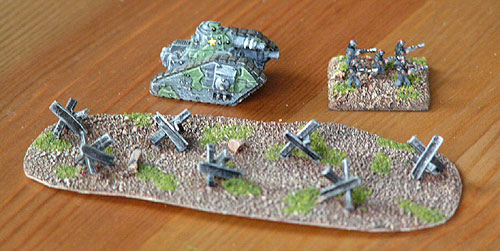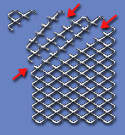|
|
©1999-2003. All rights reserved. |
Fences & Fortifications
Chain-link fence
 The fence posts are made by splitting matchsticks with a scalpel. The fence itself is aluminium car body repair mesh, which can be cut to size with a good pair of scissors.
Tank traps
 First cut a long strip of thin card. Score it down the middle and then fold it in half to make an L-shape. This can then be cut into short lengths and glued together in sets of 3 with super glue to form the tank traps. The tank traps are painted black, then drybrush with dark silver.
Barbed wire
 Cut a piece of card to form the base, and stick on split matchsticks for fence posts. Paint with PVA and sprinkle with sand to form the ground texture. Base coat the sand with dark brown, drybrush with lighter brown and add patches of flock. Finally stick on the barbed wire.
Hedge
 The basis for hedge is the foam from blister packs. Cut this into strips and soak it with watered down black acrylic.
The basis for hedge is the foam from blister packs. Cut this into strips and soak it with watered down black acrylic.Once the black has dried, drybrush with a medium green and then a lighter green. Alternatively you could paint it with watered-down PVA and dip in flock.
Rubble
 Chunks of cork tile form the basis for the rubble, with a couple of bits of sprue.
These were stuck to a card base, painted grey, drybrushed to highlight, and then
random patches of flock were added to give the impression of overgrowing vegetation.
Chunks of cork tile form the basis for the rubble, with a couple of bits of sprue.
These were stuck to a card base, painted grey, drybrushed to highlight, and then
random patches of flock were added to give the impression of overgrowing vegetation.
|

©2004. All rights reserved.
| |

 Cut aluminium
Cut aluminium